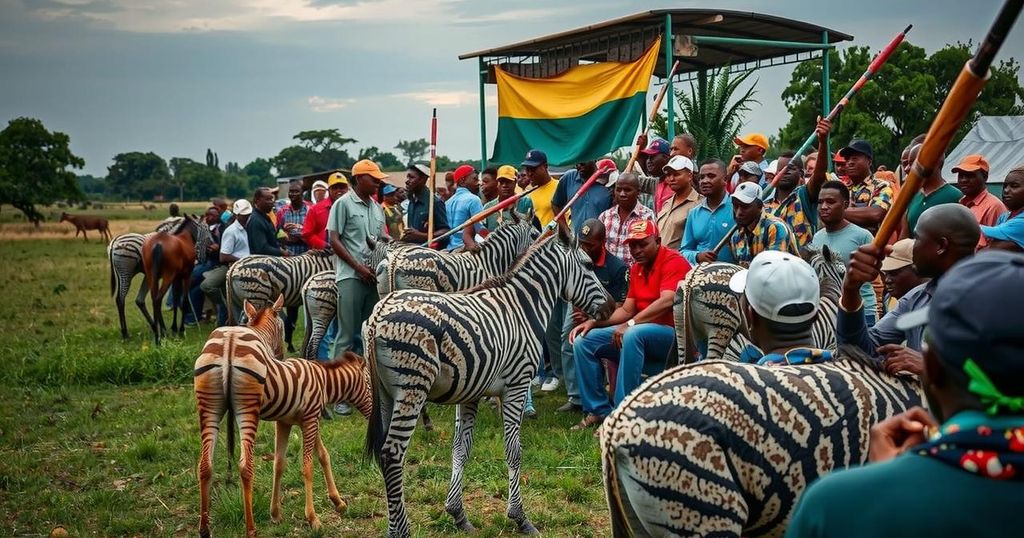Coalition Opposes Wildlife Culling in Namibia and Zimbabwe Amid Drought Crisis
A coalition of conservation organizations opposes Namibia and Zimbabwe’s proposed wildlife culling, citing threats to endangered species and ecosystems, and calling for sustainable alternatives to address drought-related food insecurity without resorting to mass killings of wildlife.
A coalition of prominent animal protection and conservation organizations, including World Animal News, Peace 4 Animals, Born Free USA, and the Born Free Foundation, has voiced strong opposition to the recent proposals by Namibia and Zimbabwe to cull large numbers of elephants and other wildlife. The slated culling threatens not only the survival of these iconic species but also the integrity of crucial ecosystems. In late August 2024, Namibia declared plans to kill 723 wild animals, which later escalated to 1,002, including 83 elephants. Subsequently, Zimbabwe announced its intention to slaughter at least 200 elephants. These drastic measures have been rationalized as attempts to provide meat to communities affected by extreme drought and to manage overpopulation and land resource balance. However, implementation of such mass killings poses severe threats to both wildlife populations and ecosystem stability. The coalition asserts that utilizing wildlife culling as a means to ensure food security is unsustainable and would not adequately address the food needs of affected populations. The killing of animals may inadvertently exacerbate issues of poaching and increase illegal wildlife trafficking. Furthermore, this strategy does not resolve human-wildlife conflicts but may unintentionally escalate tensions, traumatizing remaining wildlife and potentially leading to increased aggression towards humans. Culling elephants may also trigger significant market pressures on the ivory trade, with concerns regarding Namibia and Zimbabwe’s ongoing efforts to overturn international bans on ivory sales for revenue generation. Such actions could fuel demand and contribute to increased poaching across the region. Moreover, the culling contradicts past practices that were heavily criticized due to the cruel methods employed and the psychological impact on intelligent and social species like elephants. The IUCN Red List categorizes African savanna elephants as endangered, with a continental decline of at least 60% over the last five decades. Despite claims of overpopulation, scientific data indicates that elephant populations in southern Africa have remained stable since 2014. Organizations such as the Center for Natural Resource Governance and the Pro Elephant Network have joined in voicing their apprehensions regarding the financially motivated implications of these proposals, arguing for prioritization of conservation over commercial exploitation of wildlife. While acknowledging the serious drought impacting both human and animal populations, these groups emphasize the need for sustainable agricultural practices and improved land governance to meet the challenges presented by the current crisis. Experts recommend alternative strategies for addressing food security without resorting to wildlife culling, including the provision of grain. Additionally, effective policies exist to mitigate human-wildlife conflict without resulting in the indiscriminate killing of animals. The coalition urges the governments of Namibia and Zimbabwe to reconsider their current plans and instead invest in humane and sustainable solutions to support both human communities and wildlife. Finally, donor nations are encouraged to condition aid on the adoption of effective, sustainable measures that ensure food security while protecting endangered wildlife species.
The issue of wildlife culling in Namibia and Zimbabwe has drawn significant attention from conservation organizations and animal rights advocates. The announcement of plans to drastically reduce populations of elephants and other species has sparked international outrage, given the precarious status of these animals and the potential consequences for ecosystems. This culling initiative is framed as a response to drought conditions impacting local communities, raising ethical and sustainability concerns regarding the management of wildlife populations. The historical context of past culling efforts in the region, alongside the contemporary implications for tourism and conservation, further complicates the discussion surrounding this issue.
The coalition of animal protection and conservation organizations vehemently opposes the proposed culling of wildlife in Namibia and Zimbabwe, arguing that these measures threaten both endangered species and the ecosystems they inhabit. Given the unsustainable nature of such actions and the historical context of their impacts, it is critical that governments explore humane alternatives that address the challenges posed by drought while preserving wildlife populations. The call for sustainable agricultural practices and effective human-wildlife conflict mitigation strategies underscores the necessity for a comprehensive approach to conservation that prioritizes both human needs and ecological integrity.
Original Source: www.zawya.com




Post Comment